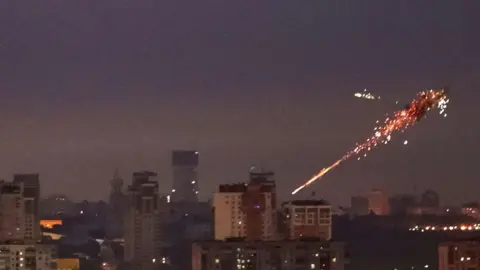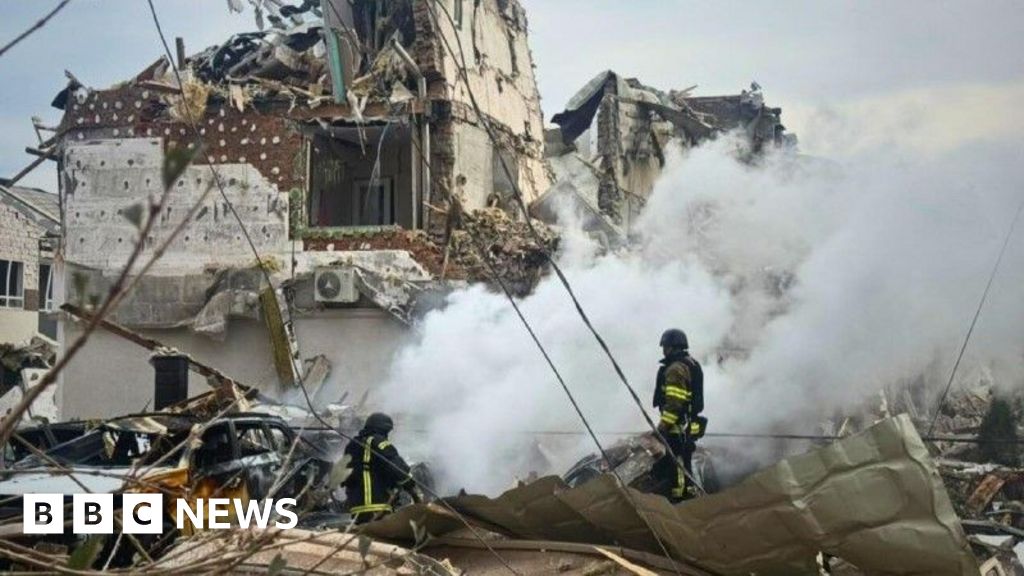James WaterhouseKyiv correspondent, and
Rachel Muller-Heyndyk
A Russian aerial bombardment that lasted more than 12 hours has killed at least four people and injured at least 70 others in Ukraine.
President Volodymyr Zelensky said the deaths all occurred in the capital, Kyiv, where many of the projectiles were aimed, and the victims included a 12-year-old girl.
The barrage – involving nearly 600 drones and several dozen missiles aimed at seven regions of Ukraine – is one of the heaviest in recent months.
Zelensky warned that Ukraine would retaliate and said the “vile” attack showed Moscow “wants to continue fighting and killing”. Russia said it struck military facilities and industrial enterprises supporting Ukraine’s armed forces.
For Ukrainians, aerial bombardments can be both random and routine.
They tend to occur late on Saturday evenings – in this case, the first sirens were heard at 22:00 GMT.
The sound of anti-aircraft fire was punctuated with occasional explosions – presumably either from the sound of an intercepted drone or one hitting its target.
In Kyiv, the country’s air alert app urged people to head to shelters and stay there. They were followed by pings warning of an increased aerial threat as hundreds of drones descended on the city.
Ukraine’s Defence Minister Igor Klymenko said that at least 100 civilian sites had been damaged across the country by the attack, with entire neighbourhoods lefts in ruins.
Emergency services said an attack on Kyiv’s Institute of Cardiology had killed a nurse and a patient.
A large bakery, an automobile rubber factory, as well as apartment buildings and civilian infrastructure were also targeted, Zelensky said.
He added that Zaporizhzhia, Khmelnytskyi, Sumy, Mykolaiv, Chernihiv and Odesa regions were also hit.
Zaporizhzhia’s Governor Ivan Fedorov said 34 people had been injured in the region, including three children – two boys, aged 11 and 12, and a nine-year-old girl.
One boy was caught in an explosion while the other had suffered carbon monoxide poisoning, he said. Both are in a serious condition.
Sumy’s regional governor said a 59-year-old man had died in strikes in the past day.
Zelensky vowed that Ukraine “will strike back” in a bid to “force diplomacy” from Russia, and said he was counting on a “strong reaction” from Europe and the US.
“This dastardly attack took place in fact as the end of the week of the UN General Assembly, and this is how Russia declares its real position,” he said.
Zelensky reiterated his support of US President Donald Trump’s threat of harsher sanctions on Russia, as well as his call for European allies to curb their Russian oil and gas imports.
Trump has recently shifted his position on the war, saying for the first time last week that he thought Ukraine could retake the land it had lost from Moscow as the Russian economy flagged under the strain of a prolonged war.
The US president has so far desisted from imposing further sanctions on Russia, but has appeared increasingly frustrated with the lack of eagerness from the Kremlin to begin peace talks.
 Reuters
ReutersZelensky said on Saturday that Russia would not stop its aggression with Ukraine – which is why it was testing European air defences with the recent incursions in several countries belonging to the Nato military alliance.
Meanwhile, jets were scrambled in neighbouring Poland early on Sunday as Russia hit western Ukraine, the nation’s armed forces said.
The Polish military described the actions – which have become routine since Polish and Nato aircraft shot down three Russian drones in Poland’s airspace on 10 September – as preventative.
Denmark’s Defence Ministry confirmed on Sunday that it had observed drones over military sites for a second night in a row.
Nato has now said it will upgrade its mission in the Baltic Sea in response, including enhanced surveillance and stationing at least one air defence frigate there.
It follows a series of incidents in which drones appeared over Danish airports, causing disruption to air traffic. Danish officials said they had no evidence to suggest Russian involvement in what they described as a concerted attack, while Moscow denied responsibility.
Along with Poland, Estonia and Romania have also accused Russia of violating their airspace, prompting a renewed Nato to bolster the alliance’s eastern flank.
Trump has gone as far as to say that Nato nations should shoot down Russian planes in their airspace.
In a speech to the UN General Assembly on Saturday, Russia’s Foreign Minister Sergei Lavrov said his country had no intention of attacking EU or Nato member states – but warned of a “decisive response” to any “aggression” directed towards Moscow.


